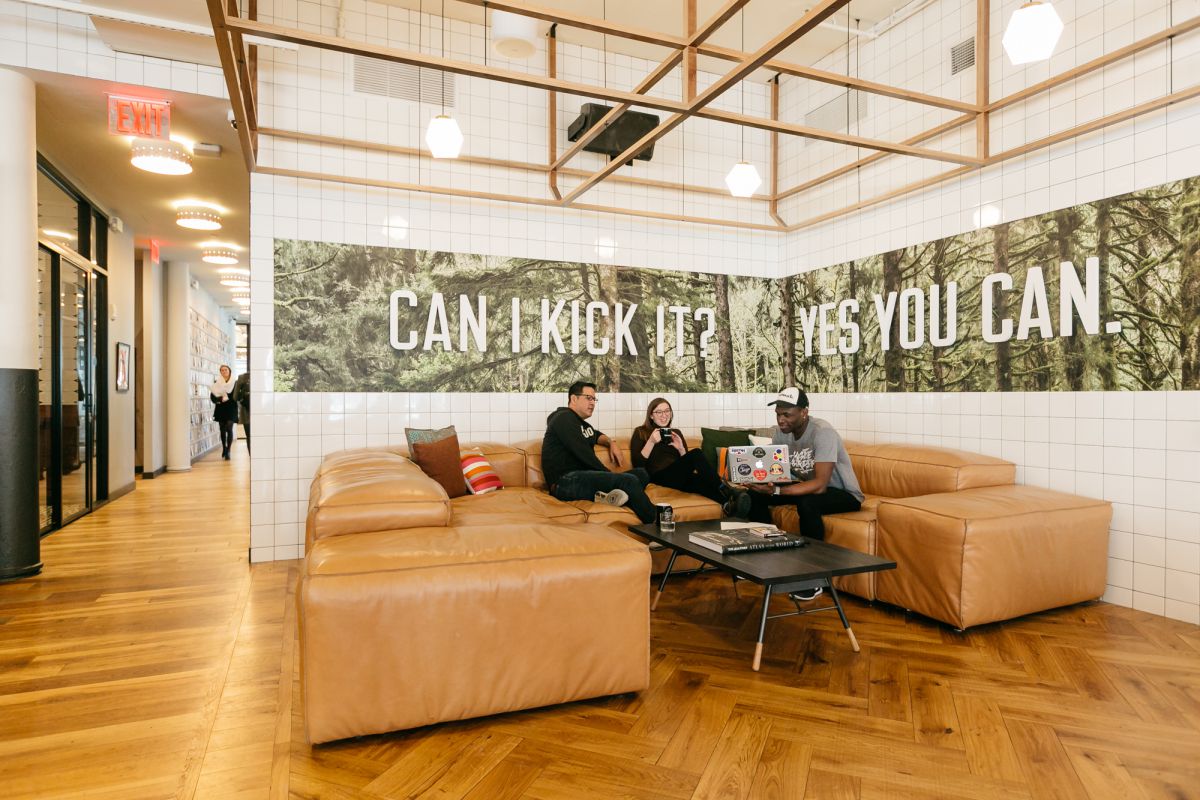
2016 was a big year for New York-based WeWork, solidifying the company’s standing as the predominant leader in the coworking market. Over the last year, WeWork opened its first coliving venture, raised a huge amount of funding to grow its global footprint and continued to grow its vast network of coworking locations in New York City.
This kind of explosive growth is not unfamiliar to the seven-year-old company, which opened its first location in Soho in 2010 and has since expanded to over 100 locations worldwide. The company also counts over 1,000 employees on its staff, through which it cultivates a "work-hard, play-hard" ethos often found among entrepreneurs.
To find out more about what it’s actually like to work for the biggest coworking community in the world, we caught up with Jen Berrent, Chief Culture Officer and Chief Legal Officer at WeWork. Berrent spearheaded WeWork's collaborative and entrepreneurial culture when she initially joined the company as General Counsel, growing her Legal team to act as a central support system for WeWork's overall community.

What does being a Chief Culture Officer mean?
Our mission is at the center of everything we do at WeWork, which means that every day we are focused on helping to create a world where people make a life, not just a living. When you are a WeWork member, you are part of a global network of companies and entrepreneurs that want to work together to create, innovate and be generally inspired by one another. Being Chief Culture Officer means that I oversee various parts of our company to ensure that our employees also feel directly connected to our mission, brand, and values. I believe it’s important all employees understand how their work impacts our community and that they have the opportunity to learn, develop their careers, and be recognized and rewarded while contributing to WeWork.
How did you transition into this role from your role as General Counsel?
As General Counsel, I initially grew my team under the belief that the Legal department needs to act as the foundational support system for WeWork’s operations and overall growth. We established processes and policies that helped us open more locations, operate in different regions, grow WeWork’s team and work with more partners. We work together, are flexible, take smart risks that will benefit the community, help develop each other’s skills and operate with a shared “work hard and smart” mentality. Because of my focus on developing this team’s culture, it was a logical next step for me to think more holistically about WeWork’s overall culture, across functions and regions.
How does your past experience inform this new role?
Before joining WeWork in 2014, I worked with various tech companies and startups throughout my career, so I became familiar with the benefits and challenges of building teams at various stages of a company’s development. In this role, I witnessed firsthand how a strong internal culture can help facilitate great success for a company. The more companies I worked with, the more easily I could discern the positive attributes of culture and potential pitfalls to avoid.
Why was the role of Chief Culture Officer created at WeWork?
WeWork has grown significantly and scaled the business globally in the past two years. In addition, we have a young workforce — the average age of our employees is about 28 — that joined WeWork to take part in broad societal shift in how people work. We’ve worked hard to offer our members the most vibrant, innovative and connected community platform and now, we want to make sure we have the right programs and support systems in place for our employees. This will allow us to continue offering an unparalleled community experience with the most effective, satisfied, and fulfilled employees.
What are some initiatives you are putting in place?
Our first undertaking was to create a specially-appointed team that would focus solely on enriching our culture as we grow. This group — called our 'culture committee' — includes senior leaders like Miguel, our Chief People Officer, John Reid-Dodick, and myself, along with other rising leaders around the organization. We also selected individuals across functions and geographies to serve as culture ambassadors.
The idea is that 10 percent of our people are culture ambassadors — who advocate for our mission and live and breathe our values — and 10 percent of our culture ambassadors are on the culture committee. With this structure, we’ve created a clear line of communication that is more connected and human, allowing for our employees to have their voices heard at senior levels, for our leadership to better communicate our strategy and priorities with people around the world; and for culture ambassadors to participate in working groups that help deliver culture initiatives.
We believe that by having this direct connection, we can foster greater transparency, more open dialogue, and empower our employees to take actions that will strengthen our culture and benefit the entire organization.
What are your goals as Chief Culture Officer?
When Adam and Miguel founded WeWork in 2010, they knew that they wanted to create something that was bigger than any individual and had a long-term, lasting impact on how people work and live.
It’s clear we’ve already made great strides in achieving this since we have more than 80,000 members in over 100 locations across more than 30 cities and 12 countries, so now we must focus on fostering this strong foundation to support our employees’ career development and enable future growth. My overall goal is to make sure that every WeWork employee is empowered in their role, feels uniquely connected to our mission, is recognized for their hard work and understands that they are part of an organization that wants them to succeed.
Know of a company that deserves coverage? Let us know or tweet us @builtinnewyork.



